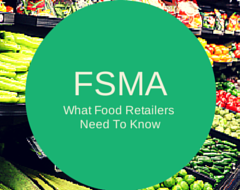By: Stephanie Barnes, Regulatory Counsel, Food Marketing Institute 
This post is part of a series on What Food Retailers Need to Know about the Food Safety Modernization Act.
Included in the Food Safety Modernization Act (FSMA) is a mandate that the U.S. Food and Drug Administration (FDA) require comprehensive, science-based preventive controls for food facilities that process, pack or hold food regulated by FDA. It does so by requiring food facilities to evaluate the hazards within their operations, implement and monitor effective measures to prevent contamination, and have a plan in place to take any necessary corrective actions. The proposed requirements are incredibly complicated and riddled with enough legal jargon to make your head spin; so the question becomes - what does FSMA really require food retailers to do?
For food retailers, the FMSA preventive controls plan will mean that retailers with central kitchens, or offsite production facilities, and retailers and wholesalers with distribution centers will be required to implement a written food safety plan. For food retailers, the FMSA preventive controls plan will mean having to put pen-to-paper and have a written food safety plan that is part of the company culture. This plan needs to become every retailer’s food safety creed. The failure to do so is against the law, subject to criminal penalties and even jail time.
What is a preventive control?
Preventive controls include steps that a food facility would take to prevent or significantly minimize the likelihood of problems occurring. Preventive controls can be process, sanitation or allergen controls. The preventive controls plan requires a facility to have a written food safety plan that must contain the following:
- An evaluation of the hazards that could affect food safety;
- Specification of what preventive steps or controls will be put in place to significantly minimize or prevent the hazards;
- Specification of how the facility will monitor these controls to ensure they are working;
- Routine maintenance of records, and;
- Specification of what actions the facility will take to correct problems that arise.
This comprehensive plan should be viewed as a living, breathing document that requires recordkeeping and constant monitoring to ensure the food safety plan is working for each individual facility. FDA has indicated that a “qualified individual” is required to oversee the plan. The preventive controls plan also must be reanalyzed on an ongoing basis if there is a significant change, the facility becomes aware of a new hazard, a preventive control is found to be ineffective, you have to initiate a corrective action you had not previously thought about, or you receive a notice from the FDA.
A final rule is expected in August 2015. Registered food facilities will be required to comply with the new regulations one year following a final rule.
The good news is that FMI is here to help and has already developed draft guidance for the preparation of a retail distribution center food safety plan. Once the final regulations are published, FMI will update and provide a final plan that our members can use to ensure they are in compliance.
For additional information and resources, please visit FMI’s FSMA Resource webpage.


 Industry Topics address your specific area of expertise with resources, reports, events and more.
Industry Topics address your specific area of expertise with resources, reports, events and more.
 Our Research covers consumer behavior and retail operation benchmarks so you can make informed business decisions.
Our Research covers consumer behavior and retail operation benchmarks so you can make informed business decisions.
 Events and Education including online and in-person help you advance your food retail career.
Events and Education including online and in-person help you advance your food retail career.
 Food Safety training, resources and guidance that help you create a company food safety culture.
Food Safety training, resources and guidance that help you create a company food safety culture.
 Government Affairs work — federal and state — on the latest food industry policy, regulatory and legislative issues.
Government Affairs work — federal and state — on the latest food industry policy, regulatory and legislative issues.
 Get Involved. From industry awards to newsletters and committees, these resources help you take advantage of your membership.
Get Involved. From industry awards to newsletters and committees, these resources help you take advantage of your membership.
 Best practices, guidance documents, infographics, signage and more for the food industry on the COVID-19 pandemic.
Best practices, guidance documents, infographics, signage and more for the food industry on the COVID-19 pandemic.
